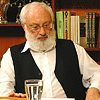Hebrew—Information about the Object
 Question: If a person reads The Book of Zohar in Hebrew, do the Hebrew symbols influence him much more than when reading in his own language?
Question: If a person reads The Book of Zohar in Hebrew, do the Hebrew symbols influence him much more than when reading in his own language?
Answer: If he sets his heart and his intentions in the right way, it affects him in exactly the same way.
The fact is there is a lot of additional information in the Hebrew word itself. And less so in other languages.
For example, the sentence “Moses took a ram and slaughtered it on the altar” in Hebrew has a slightly different meaning than, say, in Russian. “Altar” in Hebrew is “kurban,” “karov,” “akrava” from the word “approach.” And then you already start to think: “What does it have to do with “approaching”?
Or the word “mikvah” is a ritual pool. What does it mean? Mikvah is a property of Bina from the words “mikave, emunaʹ,” and so on.
That is, the word itself carries information about the object it talks about. Thus, if you translate it correctly, it gives you an idea of the object itself or the meaning of the action.
It is not so pronounced in other languages. Therefore, when I read the Torah, Psalms or any texts known to a wide range of people, for me these perceptions are much deeper and wider than the way other people perceive them.
[315784]
From KabTV’s “I Got a Call. Mother Tongue” 9/21/11
Related Material:
Hebrew – A Mathematical Language
Hebrew Is The Language Of The Light
Hebrew, The Key To The Spiritual World







Discussion | Share Feedback | Ask a question